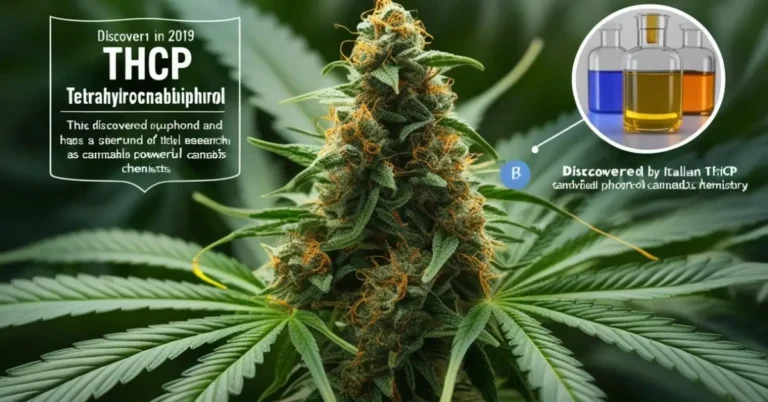In the ever-evolving world of cannabis research, Tetrahydrocannabiphorol (THCP) has emerged as a fascinating and powerful cannabinoid. Discovered in 2019 by Italian researchers, THCP has garnered significant attention due to its potential potency and unique properties. This compound has sparked curiosity among scientists, medical professionals, and cannabis enthusiasts, as it offers a deeper understanding of the cannabis plant’s complex chemistry.
The Basics of THCP
THCP is a naturally occurring cannabinoid found in the cannabis plant. It is a homolog of tetrahydrocannabinol (THC), the compound most commonly associated with the psychoactive effects of cannabis. The key distinction lies in THCP’s molecular structure, which features a longer alkyl chain compared to THC. This seemingly minor difference plays a critical role in THCP’s potency and interaction with the human body’s endocannabinoid system.
THCP vs. THC: What Sets Them Apart?
While THCP and THC share many similarities, they also differ in ways that make THCP stand out. Here’s how the two cannabinoids compare:
| Aspect | THC | THCP |
|---|---|---|
| Discovery | Long-studied and widely known | Discovered in 2019, relatively new |
| Chemical Structure | 5-carbon alkyl chain | 7-carbon alkyl chain |
| Potency | Moderate psychoactive effects | Up to 33 times higher receptor binding |
| Effects | Euphoria, relaxation, altered perception | Potentially stronger, more pronounced |
| Therapeutic Potential | Pain relief, anti-inflammatory benefits | Similar but likely enhanced effects |
The main chemical difference is the length of their alkyl chains. THC has a five-carbon chain, while THCP features a seven-carbon chain. This difference enhances THCP’s ability to bind to CB1 receptors in the endocannabinoid system, resulting in a more powerful interaction.
How Does THCP Work in the Body?
THCP interacts with the endocannabinoid system, a network of receptors and signaling molecules that regulate various bodily functions, including mood, appetite, pain sensation, and immune response. The two primary receptors in this system are CB1 and CB2.
- CB1 Receptors: Found predominantly in the brain and central nervous system, these receptors are responsible for the psychoactive effects of cannabinoids.
- CB2 Receptors: Located in peripheral tissues, these receptors influence inflammation and immune response.
THCP binds strongly to CB1 receptors, much more so than THC. This stronger binding affinity is believed to amplify its psychoactive effects and therapeutic potential. Even small doses of THCP may elicit significant effects due to this enhanced receptor interaction.
Potential Benefits of THCP
Although research on THCP is still in its infancy, early studies and anecdotal evidence suggest it may have several benefits:
- Enhanced Pain Relief: THCP’s strong binding affinity to CB1 receptors could make it an effective option for managing chronic pain.
- Improved Sleep Quality: Its potent effects may help individuals struggling with insomnia or other sleep disorders.
- Anti-Inflammatory Properties: Like other cannabinoids, THCP may reduce inflammation, potentially aiding conditions like arthritis or autoimmune disorders.
- Lower Doses Required: Due to its potency, smaller amounts of THCP might achieve the desired effects, reducing the risk of overconsumption.
Is THCP Safe?
The increased potency of THCP raises questions about its safety. While THC is generally well-tolerated, excessive consumption can lead to side effects such as anxiety, paranoia, and impaired motor skills. With THCP’s stronger effects, users may be more susceptible to such adverse reactions, especially if consumed in higher doses.
More research is needed to establish safe usage guidelines, understand its long-term effects, and determine how it interacts with other cannabinoids and substances.
THCP in the Cannabis Market
As THCP gains recognition, its presence in the cannabis market is expected to grow. However, because THCP is found in trace amounts in most cannabis strains, extracting and isolating it can be challenging and costly. This rarity adds to its allure and positions it as a premium product in the cannabis industry.
THCP is likely to appear in:
- Concentrates: Highly potent products designed for experienced users.
- Medicinal Formulations: Targeted therapies for pain, sleep, and inflammation.
- Custom Strains: Cannabis strains bred to contain higher levels of THCP.
Challenges in THCP Research
Despite its potential, studying THCP comes with challenges:
- Limited Availability: THCP occurs naturally in minimal amounts, making large-scale studies difficult.
- Regulatory Hurdles: Cannabis remains a controlled substance in many regions, complicating research efforts.
- Lack of Awareness: As a newly discovered compound, THCP is not yet widely recognized or understood.
A Look to the Future
THCP’s discovery has opened the door to a deeper exploration of cannabinoids and their effects on the human body. As research progresses, THCP could play a crucial role in developing new therapeutic applications and reshaping the cannabis industry. Its high potency and unique properties make it a promising candidate for further investigation.
Insightful Comparison Chart
| Property | THC | THCP |
|---|---|---|
| Alkyl Chain Length | 5 carbons | 7 carbons |
| Receptor Affinity | Moderate | 33x stronger |
| Psychoactive Effects | Euphoria, mild alterations | Intense, pronounced changes |
| Medical Applications | Pain relief, stress reduction | Potentially more effective |
| Dosage Requirements | Higher doses needed | Lower doses sufficient |
Explore More: Related Content
For those interested in the science behind cannabinoids and their effects, consider watching educational videos on this topic. Here’s a YouTube video (placeholder link) that delves into THCP’s discovery and potential.
Final Thoughts
THCP is a remarkable addition to the ever-growing list of cannabinoids. Its discovery underscores the complexity of cannabis and its potential for both medicinal and recreational use. While much remains to be learned about THCP, its potency and unique properties make it a subject of great interest in the cannabis community. As research continues, THCP could redefine how we understand and utilize cannabinoids.
Would you like to dive deeper into related topics or explore specific uses of cannabinoids? Let me know!

